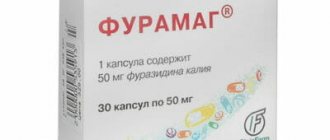Instructions for use
Pills
The medicine in tablet form is prescribed to patients with acute diarrhea. The initial dose is 4 mg. In the future, you should take 2 mg until the normal consistency of stool is restored.
In the chronic form of the disease, you first need to take 2 mg. Subsequently, the dosage is determined for each patient individually. The maximum permissible single dose should not be more than 12 mg. It is permissible to take no more than 16 mg per day.
Taking the drug in the absence of side effects continues until the frequency of bowel movements with solid feces is reached twice a day.
Capsules
Use capsules for acute diarrhea, no more than 3 mg per dose. After each bowel movement with liquid stool, take 2 mg. In the chronic form, the daily dosage is 4 mg.
In both cases, you can take no more than 16 mg per day.
For children
Loperamide in tablet form can be taken by children aged 4-8 years. The daily dose is no more than 4 mg. It needs to be divided into 4 times. Take within 72 hours. Children from 9 to 12 years old can take 2 mg 4 times a day for 5 days.
The medicine in capsule form is approved for use by children from 6 years of age. In the acute form of the disease, 2 mg is prescribed after each bowel movement with the release of liquid feces.
In the chronic form of the disease, you can take 2 mg per day. The maximum daily dose is 6 mg for every 20 kg of body weight.
#1 How does it work?
Loperamide is used to treat acute or chronic diarrhea.
Loperamide acts on opioid receptors in the intestinal wall, slowing down its contraction, increasing the transit time of intestinal contents through the digestive tract, and also enhancing the ability of the intestinal wall to absorb fluid. The stool becomes less watery and the number of bowel movements decreases.
Loperamide increases the tone of the anal sphincter, thereby reducing fecal incontinence and the urge to defecate.
Loperamide has no effect on the brain or central nervous system.
This drug suppresses the gastrocolic reflex and may directly inhibit (suppress) the secretion of fluids and electrolytes or stimulate the absorption (absorption) of salt and water.
Contraindications
In the process of taking the medicine, painful and other conditions were identified that were negatively affected by the medicine. In such conditions, you should immediately stop taking the drug. Before taking Loperamide, you should familiarize yourself with the list of contraindications and make sure that there are no such conditions.
Contraindications include:
- intestinal obstruction;
- individual increased susceptibility to the constituent components;
- acute ulcerative colitis;
- lactation period;
- 1st trimester of pregnancy;
- constipation;
- children under the age of 4-8 years (depending on the manufacturer).
#3 Disadvantages of loperamide
People 18 to 60 years of age who are not taking any medications or have other medical conditions are likely to experience the following side effects:
- Constipation (as a consequence of taking more loperamide).
- Dizziness or drowsiness, which may affect your ability to drive or operate machines.
- Bloating, loss of appetite, abdominal pain and skin rash.
The drug may not be suitable for you in the following cases:
- with intestinal obstruction, abdominal pain without diarrhea, blood or mucus with diarrhea;
- with rare hereditary forms of galactose intolerance, Lapp lactase deficiency or glucose-galactose malabsorption syndrome, since the capsules may contain lactose;
- during pregnancy and breastfeeding, except on the advice of a doctor.
Be careful!
In general, older adults and children, people with liver or kidney disease, heart disease, diabetes and seizures, and people taking other medications that interact with ibuprofen are at greater risk of developing a wide range of side effects.
Adverse reactions
The following negative effects may occur:
- allergy;
- bloating;
- weakness;
- gagging;
- difficult emptying;
- feeling of dry mouth;
- dizziness;
- discomfort and pain in the abdominal area.
In rare cases, there may be urinary retention.
#5 Recommendations
- Loperamide can be taken with or without food.
- When using loperamide, strictly follow the instructions and do not exceed the dosages indicated therein. Use the drug only for its intended purpose.
- Drink more fluids, as during diarrhea the body loses a lot of water and becomes dehydrated.
- Avoid overheating and dehydration while taking loperamide.
- If loperamide makes you drowsy, do not drive or operate machinery. Avoid using loperamide with alcohol.
- If diarrhea does not go away within 48 hours or worsens, bloating or stomach tenderness occurs, consult your doctor.
Be careful! Stop taking loperamide and get medical help right away if you develop rash, itching, facial swelling, difficulty breathing, bloating, blood in your stool, or severe dizziness.
Overdose
Cases of overdose with any form of the drug are possible. Appears as:
- problems with coordination;
- drowsiness;
- difficulty breathing;
- stupor;
- intestinal obstruction.
Naloxone is considered the antidote of the drug. Since the duration of action of the antidote is shorter than that of Loperamide, repeated administration may be necessary. In addition to Naloxone, other actions must be taken to help suppress the signs of overdose. Such measures include: cleansing the gastrointestinal tract, taking enterosorbents. In some cases, ventilation may be necessary.
#7 Interaction
Medicines that interact with loperamide can reduce its effectiveness, change its duration of action, and increase side effects. An interaction between two medications does not always mean that you should stop taking one of the medications, but sometimes it is necessary to do so. Talk to your doctor about which medications can and cannot be combined with loperamide.
Medicines that may have a moderate interaction with loperamide:
- lumacaftor and other P-glycoprotein substrates;
- sincalide;
- haloperidol;
- quinidine;
- ilamiodarone;
- ondansetron;
- opioids;
- Ramosetron.
Please note that this list is not comprehensive and only includes common medications that may interact with loperamide. For more detailed advice about the interaction of loperamide with other drugs that you take, contact your doctor and carefully read the instructions for the drug.
Can I drink alcohol while taking antibiotics?
We have found that alcohol and antibiotics have a hepatotoxic effect. It turns out that if you combine them, the attack on liver cells will intensify many times over. This is the first reason why you should not drink alcohol during antibacterial therapy. But there are others.
A small portion of beer or wine will not destroy the liver. However, it is sufficient to activate the protective reaction of the gastric mucosa. Medicines will not be properly absorbed under such conditions. When antibiotics interact even with weak alcohol, the effect of antibacterial therapy will be minimal, if not zero. Therefore, it is better not to allow such a combination.
Causes of alcoholic diarrhea
| Intoxication of the body. | Changes in intestinal microflora. | Development of concomitant diseases. |
| The main component of alcoholic beverages is ethyl alcohol (ethanol), which not only irritates the mucous membranes of the oral cavity and digestive tract, but also disrupts neurohumoral regulation and also has a toxic effect in general. In case of poisoning, the body strives to cleanse itself of harmful substances - the breakdown products of ethanol. Vomiting and diarrhea after alcohol contribute to the rapid elimination of toxins, but cause a lot of discomfort and threaten dehydration. | Ethanol can increase the permeability of the intestinal wall and lead to changes in the composition of the flora, creating the preconditions for the death of beneficial microorganisms. This not only often causes diarrhea after alcohol, but also has an extremely negative effect on digestion. Due to a disruption in the composition of the microflora, beneficial substances may be less absorbed, and the intestines no longer produce vitamins necessary for the body. | If loose stools are observed regularly after alcohol, this may indicate the development of gastritis, enterocolitis, liver damage, and pancreatitis. Such pathologies often arise against the background of constant alcohol abuse due to intoxication and chronic irritation of the mucous membranes of the digestive organs. |
Why shouldn't you drink alcohol while taking antibiotics?
We found that the main reasons are the danger to the liver and the possibility of side effects. But patients often ask the question: does the intensity of the drug’s action change under the influence of ethanol?
Overall it is decreasing. While the body resists the absorption of alcohol components, it unconsciously protects itself from medications. The stronger the alcoholic drink, the less likely it is that the medicine will be completely absorbed.
If you combine ethanol with metronidazole, a synergistic effect occurs. However, it concerns not the effect of the drug itself, but its side effects:
• drowsiness;
• concentration disorders;
• heart rhythm disturbances;
• nausea;
• headache.
There are also questions about a possible overdose. There is no need to be afraid of it - there is no alcohol in antibacterial drugs. Such assumptions arise due to inattentive study of the composition of drugs.
Prevention of alcoholic diarrhea
- To prevent the occurrence of diarrhea, it is important to observe moderation in the consumption of alcoholic beverages, and, if possible, completely abstain from alcohol.
- It is unacceptable to take it on an empty stomach, in which case the negative effect on the digestive tract may be even more pronounced.
- After drinking any alcoholic beverages, regardless of strength and quantity, it is advisable to drink more liquid to prevent dehydration.
This is important to do even if there is no diarrhea.
Additional Information
Keep loperamide, like all other medicines, out of the reach of children, never share your medicines with other people, and use medicines only as directed.
Even if you find comprehensive information about your issue on this page, be sure to consult with your doctor to ensure that the information you receive actually applies to your individual circumstances.
Medmarket Pharmacy24 provides comprehensive and reliable information on issues of medicine, health and well-being, however, diagnosis and choice of treatment methods can only be made by your attending physician! Self-medication may be unsafe for your health. Medmarket Apteka24 is not responsible for possible negative consequences resulting from the use by users of apteka24.ua of the information posted on the site.
How to avoid unwanted consequences?
The simplest solution is not to mix the substances. The course of antibacterial therapy does not last long, so you can be patient and not touch alcoholic beverages. However, a bacterial infection can strike at the most unexpected moment, for example, on the eve of a wedding or anniversary. In such a situation it is important:
• Consult your doctor about the compatibility of the prescribed drug with alcohol.
• Even in the absence of contraindications, do not abuse it - limit yourself to 1-2 glasses of a weak drink.
• If there are restrictions, do not violate them.
• Wait between the last dose of the medicine and drinking alcohol for at least two days (preferably three).
There is no need to interrupt your course of antibiotics for an alcoholic party. This will negate all achieved results and you will have to start treatment again. It turns out that during the first course of therapy the microflora suffered in vain, and with the second course it will be exposed to an unnecessary threat.








